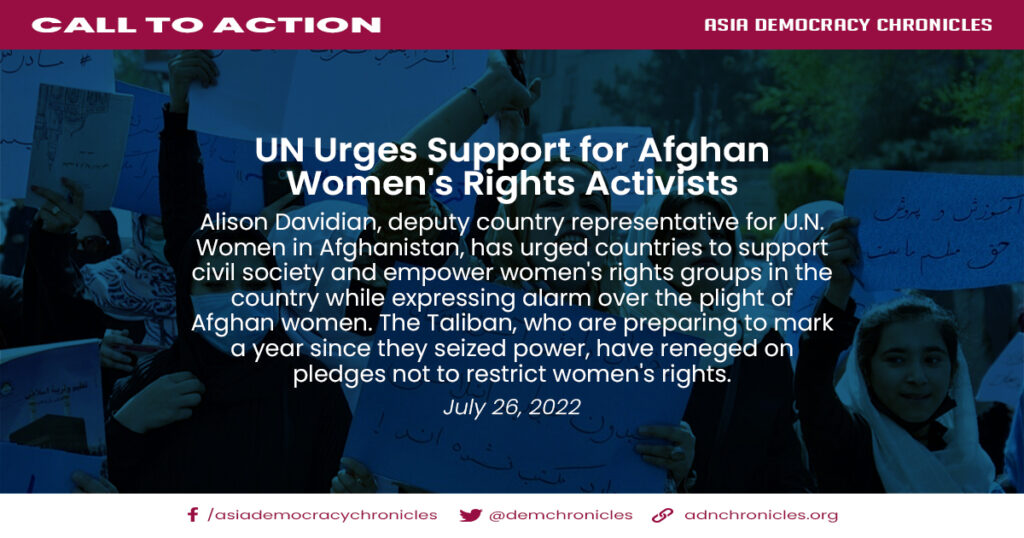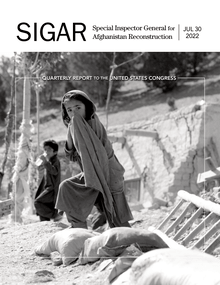 Nearly a year since the U.S. withdrew from Afghanistan, the humanitarian crisis and human rights record under the Taliban remains dire, CBS News reports. Despite the demands of the U.S. and many in the international community, the rights of women in Afghanistan have deteriorated to a level unseen since the Taliban first imposed its repressive policies in the 1990s.
Nearly a year since the U.S. withdrew from Afghanistan, the humanitarian crisis and human rights record under the Taliban remains dire, CBS News reports. Despite the demands of the U.S. and many in the international community, the rights of women in Afghanistan have deteriorated to a level unseen since the Taliban first imposed its repressive policies in the 1990s.
While opportunities for Afghan women “slowly increased” over the course of two decades, ultimately, women’s rights in Afghanistan “failed to achieve the structural change the U.S. and international partners had envisioned,” said a quarterly report released Tuesday by the special inspector general for Afghanistan Reconstruction (SIGAR).
USAID, State and Defense Department disbursed at least $787 million to programs focused on women and girls from 2002 to 2020, but the SIGAR report cites a number of obstacles, including “inconsistent implementation” by the prior Afghan government of women’s rights policies and “ingrained traditional social norms.” And the ongoing Taliban insurgency meant that women “generally faced a hostile environment,” the report adds.
 Civil society members under the umbrella of the Afghanistan Open Government Partnership have raised the alarm over alleged attempts by the Taliban-led regime to kill activists, according to Sahara Reporters.
Civil society members under the umbrella of the Afghanistan Open Government Partnership have raised the alarm over alleged attempts by the Taliban-led regime to kill activists, according to Sahara Reporters.
In an open letter dated August 1, 2022, the Open Government Partnership (OGP) Afghanistan, Open Government Partnership Afghanistan Forum (OGPAF) and Civil Society Organisations Management lamented the inhumane and brutal experience of human rights activists, women and girls in Afghanistan since Taliban overthrew the Afghanistan government in 2021.
“We are confident in your knowledge that you are aware of the current highly challenging circumstances in Afghanistan,” the letter reads. “Twenty years of collective efforts by international society ‘shoulder to shoulder’ with their Afghan counterparts collapsed just in two weeks with an uncertain future. Which not only broke the hearts of Afghans but also seriously threatened the lives of civil society activists working to preserve civil values and human rights.”
 It’s been 11 months since the fall of Kabul, and the vanishing of women is nearly complete, adds Shabana Basij-Rasikh, co-founder and president of Afghanistan’s School of Leadership. The men who rule my country wield their control with a casual cruelty that can be breathtaking. Just this month, the Taliban told female employees of Afghanistan’s finance ministry — well-educated, well-qualified women barred from their workplace for these past 11 months — to send in male relatives to do their jobs because the ministry’s workload was becoming quite heavy, she writes for the Washington Post.
It’s been 11 months since the fall of Kabul, and the vanishing of women is nearly complete, adds Shabana Basij-Rasikh, co-founder and president of Afghanistan’s School of Leadership. The men who rule my country wield their control with a casual cruelty that can be breathtaking. Just this month, the Taliban told female employees of Afghanistan’s finance ministry — well-educated, well-qualified women barred from their workplace for these past 11 months — to send in male relatives to do their jobs because the ministry’s workload was becoming quite heavy, she writes for the Washington Post.
Aug. 15 marks one year since the Taliban takeover and occupation of Afghanistan, and it’s not a happy occasion for my homeland, adds , a researcher at the University of Toronto.
 The recent United Nations Assistance Mission in Afghanistan (UNAMA) report on “Human Rights in Afghanistan” is troubling but not shocking as it highlights civilian casualties, restrictions on women’s rights and freedom of speech, extrajudicial killings and ethnic minority persecutions. Yet a lot is under-reported due to the difficulties in gathering evidence against the Taliban, which has censored the media and mistreated journalists, he writes for The Conversation.
The recent United Nations Assistance Mission in Afghanistan (UNAMA) report on “Human Rights in Afghanistan” is troubling but not shocking as it highlights civilian casualties, restrictions on women’s rights and freedom of speech, extrajudicial killings and ethnic minority persecutions. Yet a lot is under-reported due to the difficulties in gathering evidence against the Taliban, which has censored the media and mistreated journalists, he writes for The Conversation.
In response to the above developments, USIP, the Atlantic Council, the Georgetown Institute for Women, Peace and Security, the Sisterhood is Global Institute and the U.S Department of State joined have launched the U.S.-Afghan Consultative Mechanism (USACM). At last week’s launch (below), U.S. Secretary of State Antony Blinken provided remarks, and U.S. Special Envoy for Afghan Women, Girls, and Human Rights Rina Amiri moderated a discussion with representatives of the USACM platform.
Elliot Ackerman’s new book, The Fifth Act, offers a personal take on the American experience in Afghanistan, drawing on his five tours of duty in the country and in Iraq. It is a play in five acts, the fifth act being the story’s tragic denouement, a prelude to Afghanistan’s dark future.







